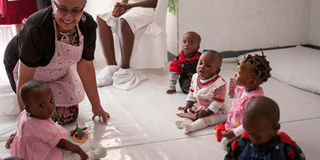Give orphans reason to anticipate bright future

First Lady Margaret Kenyatta at the Imani Children's Home. Orphans living in households receiving cash from the government were on average healthier than those not receiving any assistance. FILE PHOTO | NATION MEDIA GROUP
What you need to know:
- Most of the time, that remained pure rhetoric, with little local empirical evidence to support it.
- We have recently published baseline findings in which we compared households enrolled in this programme with those not enrolled.
- In Kenya’s economic structure, higher education is often a guarantor of a more stable lifestyle in later life.
- The risk of adverse mental health and socio-economic outcomes increases when someone has a sense of hopelessness about the future.
For a long time, we have argued that children are the foundation of the future prosperity of our country, and that taking care of their early development constitutes a substantial investment.
Most of the time, that remained pure rhetoric, with little local empirical evidence to support it.
Instead, our heroes mostly tell stories of deprived childhoods, of rising above adversity to achieve greatness, suggesting that child upbringing may have little to do with future success.
In an attempt to start providing an evidence base for our hypotheses, we designed a project to follow up orphans and neglected children in and around Eldoret.
We have recently published baseline findings in which we compared households enrolled in this programme with those not enrolled, examining several parameters including household socio-economic status, school enrolment, nutritional status of the children, and their outlook on the future.
Surprisingly, we found that those receiving cash transfer were either slightly materially worse off or no better than those not receiving cash transfer.
Does this mean the money was not making a difference to the socio-economic status of these families?
It is difficult to tell, although it is possible that these families used the money to take care of all the children in the household, not just those that were orphaned.
However, looking at other parameters, we found positive outcomes associated with the cash transfer programme.
Orphans living in households receiving cash from the government were on average healthier than those not receiving any assistance.
They were less likely to be underweight or stunted, suggesting that government support helped prevent nutritional problems in this group.
Secondly these children were less likely to miss school than those not receiving government support.
In Kenya’s economic structure, higher education is often a guarantor of a more stable lifestyle in later life.
Unconditional cash transfer might have the effect of reducing the use of orphans as child labourers, giving them the opportunity to attend school and increase their chances of future success.
Finally, children in cash transfer households were demonstrably more hopeful about the future than those not receiving government support.
Asked about how they felt about their future opportunities for success and prosperity, they were more likely to respond that they have many or limitless opportunities.
This is perhaps the most poignant finding in this study.
An individual’s current behaviour and plans are heavily influenced, consciously or unconsciously, by the optimism they feel about their future prospects.
The risk of adverse mental health and socio-economic outcomes increases when someone has a sense of hopelessness about the future, and one would not be surprised if such an individual develops depression and other severe mental disorders in later life.
A population without a positive outlook in life cannot achieve their full potential, and a responsible government will do all in its power to improve citizens’ future prospects.
Given the high and increasing levels of orphanhood and child neglect, we must continually look for ways of ensuring that even these most vulnerable members of our society are given the opportunity to be happy, to prosper and to dream of success just like children in the care of their own biological parents.
Now that we have evidence of the usefulness of cash transfers to families taking care of orphans, the government must quickly expand this programme to all those that are in need.
Dr Lukoye Atwoli is Consultant Psychiatrist and Dean, Moi University School of Medicine; [email protected]





